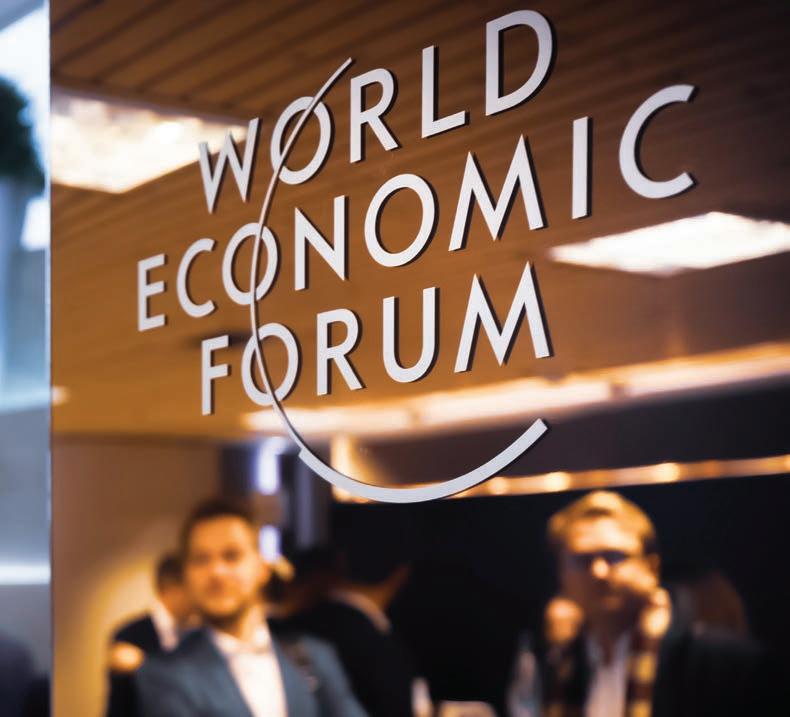
6 minute read
Davos Agenda Closes with Calls for New Models of Public-Private Cooperation
The latest Davos Agenda closed In January 2022 following headline-making dialogues with heads of state and government, international organizations, business and civil society. The week-long meeting convened leaders on “The State of the World”. It was the first global platform of the year and focused on driving concerted action among key global stakeholders. “We are seeing challenges mounting from supply chain disruptions to tectonic shifts in labour markets, to inflation figures which are of concern to policy-makers and individuals alike. The year ahead is a crucial one to work together, rebuild trust and shape a better and more inclusive future for all,” said Klaus Schwab,
Founder and Executive Chairman of the World Economic Forum.
Advertisement
World leaders spoke on the global economic outlook, energy transition, social justice, healthy futures and resiliency in special address. In order of appearance this week: “We need to embrace cooperation and jointly defeat the pandemic. Confronted by the once-in-a-century pandemic, which will affect the future of humanity, the international community has fought a tenacious battle,” said Xi Jinping, President of the People’s Republic of China. «Facts have shown once again that amidst the raging torrents of a global crisis, countries are not riding separately in some 190 small boats but are rather all in a giant ship on which our shared destiny hinges. Small boats may not survive a storm, but a giant ship is strong enough to brave a storm.» “In the midst of new challenges, the world today needs new avenues, new resolutions. Today, every country in the world needs cooperation with each other more than ever before,” said Narendra Modi, Prime Minister of India. “Our multilingual, multicultural environment is a great strength that teaches us not just to think of ourselves in times of crisis but to work in the best interests of the world.” “Turning this ship around will take immense willpower and ingenuity from governments and businesses alike, in every major-emitting nation,”
António Guterres, Secretary-Gen-
eral, United Nations said. “We see a clear role for businesses and investors in supporting our net-zero goal.” “In order for the world to meet the 2050 net-zero emission goal, we need technologies that do not yet exist, we need inventions that do not exist yet,” said Naftali Bennett, Prime Minister
of Israel.
“A key focus of my administration will be the revitalization of Japan through a new form a capitalism,” said Kishida Fumio, Prime Minister of Japan. He emphasized that the time has come for “historic economic and social transformations” and that Japan will pioneer a new form of public-private partnership, with leaders of government, industry and labour all working together to develop paradigm-shifting policies. “Some will try to tell us dialogue and compromise are forms of weakness, said Olaf Scholz, Federal Chancellor of Germany. “Some will try and pitch climate action against prosperity. Some will argue that social progress hampers economic growth. Some will try to divide us. The truth is the progress we want will only occur if we overcome these divisions. Working together is the only way and restoring trust is our goal.”
Joko Widodo, President of Indo-
nesia, spoke on the strengthening of global health resilience and the need for advanced economies and the G20 to support a renewed global architecture, “The costs will be much lower than the losses we sustained due to the vulnerability of the system during the pandemic,” he said. “Europe’s global semiconductor market share is only 10%. And today, most of our supply comes from a handful of producers outside Europe. This is a dependency and uncertainty we simply cannot afford,” said Ursula von
der Leyen, President of the European
Commission. “We have no time to lose. And this is why I announce here today that we will propose our European Chips Act in early February.” “The lesson of these times is that supply chain resilience requires a new partnership between countries, governments and businesses,” said
Scott Morrison, Prime Minister of
Australia. Access to COVID-19 vaccines continues to pose a serious problem for Africa, with fewer than 10% of populations fully vaccinated in most countries, said Yemi Osinbajo, Vice-President of Nigeria. He called for patent waivers to permit African countries to manufacture vaccines locally. “Now is

a good time to test global will,” he said, in building international cooperation to prepare for new, possibly worse pandemics to come. “We aren’t just focused on achieving a high top line growth number that is unsustainable,” said Janet L. Yel-
len, Secretary of the Treasury of the
United States of America. “We’re instead aiming for growth that is inclusive and green. The economic moment is well suited to accommodate such a modern, supply side expansion.” During the Davos Agenda, pioneering new research and project milestones were released to support stakeholders: • Sustainable finance is increasing but the funds are not always reaching those most in need – see how public-private collaboration can facilitate sustainable investment for development. • More than 100 million have been impacted by the work of the
Schwab Foundation for Social
Entrepreneurship. The foundation includes over 400 of the world’s leading social innovators operating in over 190 countries. • Davos Alzheimer’s Collaborative is a leading global initiative to accelerate progress on the discovery, testing and delivery of precision interventions – it has created a
new global system to reduce the
time and cost of clinical trials. • A new set of policy enablers to
boost investment and innovation
in digital economies was released to ensure digital transformation is inclusive and sustainable. • Quantum science promises to disrupt the future of business, science and government – the first quantum computing guidelines launched to help leaders build an equitable framework. • The global digital economy has surged off the back of the COVID19 pandemic, but so has cybercrime – ransomware attacks rose 151% in 2021 – the new annual
The Global Cybersecurity Outlook 2022 examined how leaders can
close the cyber gap and build
resilience. • The Forum worked closely with the
International Financial Reporting Standards Foundation as a member of the Technical Readiness
Working Group. In so doing, the
Forum contributed to the running start of the International Sustainability Standards Board supporting the creation of the standards prototypes that will now go through a standard-setting process. • Plastic waste was in the spotlight as world leaders this week highlighted how they are moving fast to fight the climate crisis.
Forum-supported companies are rolling out innovative reuse models to protect the planet. • Nature-positive practices, those that add value to nature, could contribute $1.9 trillion to the
economy a year and 88 million
jobs by 2030. • Cities can create 60 million jobs and save 50% on new infrastructure projects by adopting naturebased solutions. Nearly half of city
GDP, $31 trillion, is at risk of disruption from nature loss. • More partners announced plans to adopt nature-based solutions as part of the Forum’s 1t.org platform bringing total global pledges to over 30 companies committing to conserve, restore and grow more than 3.6 billion trees in over 60 countries. • Only 20% of companies both disclose their full value chain emissions and have emissions reduction targets in place. Winning the
Race to Net-Zero outlines how businesses can close the emissions gap and stay competitive. • A new accelerator dedicated to shaping the future of crypto-enabled environmental, social and governance (ESG) efforts aims to bring key players and industry leaders together to shape a more inclusive future. • The Belt and Road Initiative offers a new development paradigm through investment in green infrastructure – a new insight report highlights the role of the financial sector and how to capitalize on the growing global appetite for green investment










